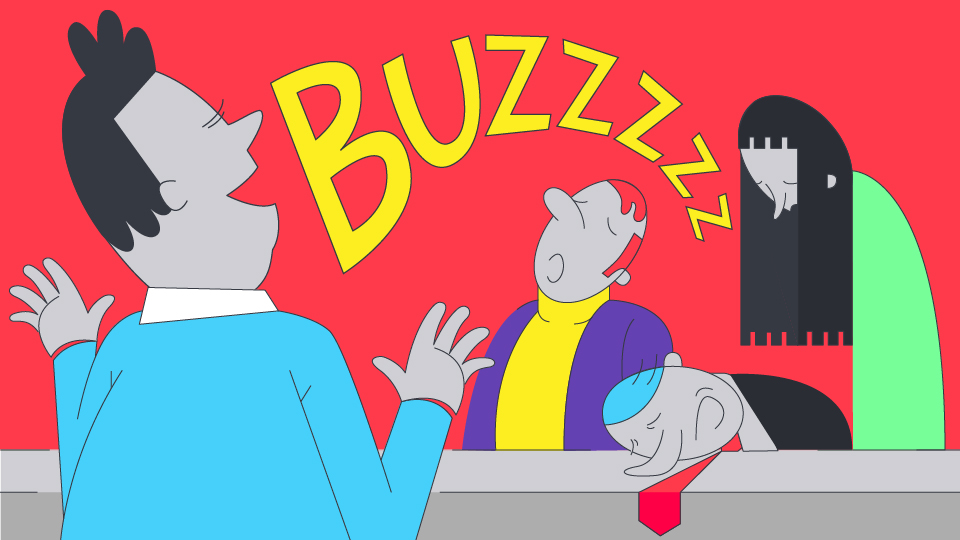Written about similar twice before — the origin of buzzwords and work as a place you pretend to be an adult — but there’s some new stuff to highlight, including this section:
In our research, we examined another motive for using jargon: Insecurity and the desire for status in one’s profession. Research has shown that status brings influence, material benefits, and psychological well-being to those who have it, whereas lacking status leaves one vulnerable to misfortune. People often compensate for a lack of status by trying to signal that they have more of it than they actually do. They may conspicuously advertise their accomplishments or highlight their memberships in prestigious groups. For example, lower-status academics are more likely to include “Dr.” or “PhD” in their email signatures than those with higher status. Experiments have also shown that people who feel insecure about their status are willing to spend more on visible high-status consumer products, but won’t spend more on products nobody will see.
No doubt. Here’s another name for the concept:
The “He’s a prick!” vs. “No, needle-dick” issue
Jargon in offices is reprehensible and runs contrary to both inclusion and psychological safety. But, for people that love them some jargon, the rationale is often:
- “It streamlines communication.”
What that really means is:
- “It allows me to know who is in my tribe and who isn’t.”
Caveman brain.
Tons of women use jargon too, relative to role and title, but it’s predominantly the domain of men, especially in the context of financial acronyms and industry-specific terms. A lot of times, you work with these guys long enough and you think constantly “He’s such a prick.” He seems to live in an invented world of words and terms that don’t mean anything to anyone outside the six people he hits meetings with all day.
The reality isn’t that he’s a prick — he might be — but that he has a needle dick, and he’s trying to find status and solace and comfort and inclusion in his own way, and his version of “I’m an ally!” is “I can use these terms too.” It’s a status play, plain and simple. The jargon and buzzwords and acronyms remain because it delineates who is in, who is out, and who is high-privilege in that regard.
In reality, tons of middle managers use the right terms and buzzwords, but they’re still not “included” — and in that way, buzzwords and jargon are a great tool for upper management, because they allow upper tiers to create the illusion that middle tiers are “part of something,” when in reality most middle managers would be pushed out of the plane over Tempe for five cents at the damn margin, and we all know that.
Jargon as a complex, code-switching dance
The single-easiest way to be successful in white-collar is to either (a) ship and sell a lot, or (b) put your head down and kiss the right ass while not slipping up politically, missing the wrong meeting, saying the wrong thing to someone in an elevator who happens to be a big client, etc.
Beyond that, there’s a lot of complicated psychological stuff you need to understand, and it varies by place, industry, leadership quality, front-line manager quality, and much more. It’s a dance, and it becomes exhausting. Zoom fatigue only makes it worse.
One of the most complicated elements of a “knowledge economy” job is who to use jargon with, and when, and what types of jargon are acceptable to and will resonate with what people. That’s a giant dance. It’s like a swing dance married to a Haka. Can you say this stuff to Tom? What about Janet? Will Janet be offended by what Tom thought was funny? Is Brian trying to be more of a conventional ally, so stuff that used to play with Brian won’t play with Brian anymore? What about Tony and Cliff and Lisa and Ashley? Can you say the same thing to them? Will they all get it, or will you be leaving people out?
It’s a tilt-a-whirl, and we wonder why people ultimately focus so much on task work — because it’s something they can control, and a lot of this jargon stuff is in place to make you feel status, and feel belonging, and feel importance, and feel relevance, and feel connection, but at the end of the day you honestly don’t control much of how you use it. It’s complicated, the perceptions are varied, and the culture of what jargon and buzzwords resonate the most existed before you, and it will exist long after you as well.
Takes?
